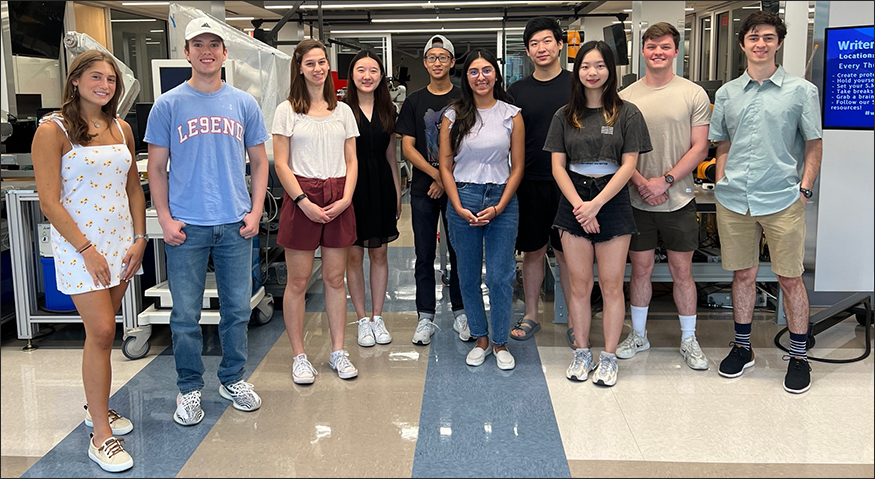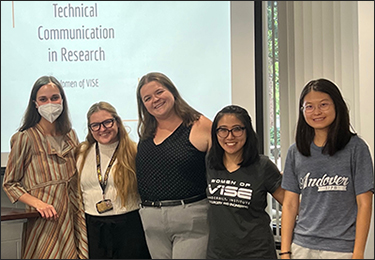
Twelve exceptional undergraduates have benefited from the addition of new workshops to a 10-week Summer Fellows program that gives students first-hand experience in research laboratories and provides financial support.
The Vanderbilt Institute for Surgery and Engineering’s Summer Fellows program expanded this year with the addition of two new workshops: Technical Communication in Research and Refining Your Professional Image. The series was spearheaded by Emily McCabe, a Women of VISE steering committee member. McCabe, WoV President Nhung Hoang, and members Katja Diaz-Grandados, Shiyu Wang, Miroslava Migovich and Neda Sardaripour designed and led the workshops.

“There were two main reasons we wanted to offer these workshops,” McCabe said. “One was to demystify some of the professional skills required in academia, and the other was to help build a stronger sense of community between the fellows and VISE affiliates.”
“The Women of VISE group seemed like a natural way to facilitate this by combining the knowledge of graduate students—many of whom had been in the shoes of a summer undergraduate researcher themselves—with the existing sense of comradery in WoV,” she said.
VISE Summer Fellows worked under the supervision of graduate students and faculty.
Xander Stabile, a biomedical engineering major, worked in the Biomedical Modeling Laboratory (BML) under the direction Harvie Branscomb Professor Michael Miga, professor of biomedical engineering and a VISE steering committee member. The program introduced Stabile to various career options that are available in biomedical research.
Stabile worked alongside graduate student Morgan Ringel to create a tracked calibration device with a two-camera system used in breast cancer surgery. Stabile submitted a proposal paper of the results of his project to an upcoming SPIE, the International Society for Optics and Photonics, conference.
Stabile said Miga and Ringel “would help me whenever I hit an obstacle, point me towards a great source to expand my knowledge, or offer a more efficient method throughout the process.”
Computer engineering major Yifan “William” Wu’s project aimed to fully automate kidney stone removal as part of a multi-lab collaborative.
“The summer research experience was not only a great opportunity for me to learn new technical knowledge like medical data manipulation and image processing, but also served as a guide and goal for the next stage of my academic career,” Wu said. He now plans to take graduate-level courses in the image processing field.
Returning VISE Fellow Aarushi Negi spent her summer studying the functional connectivity of where epileptic seizures spread in regions of the brain. Targeting these zones for resection might significantly improve rates of seizure reduction.
Negi, a neuroscience major, felt that working with working with Dario Englot, a functional neurosurgeon at Vanderbilt, and her graduate student mentors was extremely valuable as they encouraged her to come up with her own ideas for analyses and provided insight and advice during lab meetings.
“My favorite part of being a VISE Fellow has been meeting other students in the Fellows program as well as working closely with my lab members,” Negi said.
In the Neuroimaging and Brain Dynamics (NEURDY) Lab, Kate Wang investigated fMRI vigilance signals in early-stage Alzheimer’s Disease. Wang worked with graduate student Sarah Goodale and Catie Chang, assistant professor of electrical and computer engineering.
“Sarah and Professor Chang are both amazing mentors and incredibly supportive. I have learned so much with their encouragement and guidance,” Wang said. “In addition, connecting with other fellows and VISE organizations such as Women of VISE were wonderful experiences and some of the highlights of my summer.”
Stanley Vinet also joined the NEURDY Lab to work with Chang. The biomedical engineering major’s project involved mining data from a set of simultaneous EEG-fMRI data. He explored numerous EEG metrics and how they relate to the subject’s cognitive state of awareness.
“Since my dream job is a surgeon and I’m interested in the brain/human body, Professor Chang’s lab and the VISE program was a perfect opportunity to explore my interests deeper,” Vinet said.
Mechanical engineering major Andrew Haworth worked with Xiaoguang Dong, assistant professor of mechanical engineering, in the Miniature Robotics Lab creating an electromagnetic actuation system for magnetic micro-robots.
“It was very satisfying to see a system come together from beginning to end,” Haworth said. He will continue working with Dong in the fall to manufacture the parts for this configuration and assemble the new array.
Haworth added, “Overall, I have really enjoyed my experience with the VISE Summer Fellows program, and I am excited to continue my research in the fall.”
Hongyi Leo Yang joined the Machine Automation, Perception and Learning (MAPLE) Lab to work on one of Computer Science Assistant Professor Jie Ying Wu’s long-term projects: the complete automation of kidney stone removal procedure. The goal of Yang’s project is to simulate how patient tissue deforms when surgical instruments interact with the body.
Yang, a computer science major, created phantoms, configured SOFA Framework, created volumetric mesh of the phantom and simulated phantom’s deformation and interaction with rigid objects in SOFA Framework as part of his research.
“I believe this experience with MAPLE and Professor Wu will help me in places more than just soft tissue simulation,” Yang said.
Shannon Alptekin, a biomedical engineering major, conducted her summer research alongside graduate student Jesse D’Almeida in the Medical Engineering and Discovery Lab (MEDlab). Alptekin’s efforts were devoted to improving the design and functionality of a surgical robotic user interface (UI).
Using CAD software she designed, developed, printed and assembled a new user interface model: a device resembling the right half of a game controller that utilizes a touchpad with haptic force feedback. One of the challenges was designing a UI model that fit into the hands of all surgeons considering early versions constructed by the lab did not accommodate surgeons with smaller hands and were therefore ineffective.
Alptekin appreciated being welcomed into the lab by graduate students as well as Robert Webster, Richard A. Schroeder Professor of Mechanical Engineering.
“The VISE Summer Fellows program was truly a transformative experience for me, and I wouldn’t change a thing. Working among such brilliant minds on such advanced projects is enriching beyond belief,” Alptekin said.
The Diagnostic Imaging and Image-Guided Interventions (DIIGI) Lab welcomed biomedical engineering major Rui Shirley Xu. Xu explored the field of optics and worked on a project to minimize background noise while imaging the eye.
“It opened my eyes to the connections between engineering and the medical field and the possibilities out there to improve people’s wellbeing,” said Xu, who hopes to serve as a resource for undergraduate engineering students who are interested in pursuing a career in the medical field to connect with each other.
Madison Veliky returned to the program under the guidance of Nabil Simaan, professor of mechanical engineering, in the Advanced Robotics and Mechanism Applications (A.R.M.A.) Lab. The computer engineering and biomedical engineering double major researched a novel method of detecting blood clots in the brain for stroke treatment.
Currently, the surgical procedure has no way of knowing exactly where the blood clot is and relies on guesswork to extract the clot properly. Veliky’s seeks to provide an accurate measure of clot location to reduce the amount of errors in stroke treatment and decrease the time of the surgical procedure.
Veliky said she learned a lot about the thoroughness and extent of planning that goes into experimental design working with Simaan and collaborator Rohan Chitale, a Vanderbilt neurosurgeon.
“My favorite part of being a VISE Summer Fellow was limiting my focus to one project, diving deeply into my research, and being supported by expert advice through all of my approaches,” she said. “I enjoyed being a part of a community with the same passion for engineering in surgery that I have.”
Double major Zihao Wu already was a member of Soheil Kolouri’s Machine Intelligence and Neural Technologies (MINT) when he applied to the summer program. Kolouri is an assistant professor of computer science.
The math and computer science major focused on machine intelligence that can continually learn and adapt to the stream of nonstationary multimodal information or continual learning. This data becomes specifically relevant to medical applications where the data is continually accumulated from new patients and as diseases constantly mutate and new variants emerge.
“Not only does the project hone my academic skill, but it also allows me to see how machine learning can contribute this much to medical field and how technology can potentially save people’s lives,” Wu said.
The program concluded with a student-led VISE seminar in August. Each undergraduate gave a five-minute presentation and answered audience questions.
Contact: Michelle Bukowski, 615-343-5447
michelle.bukowski@vanderbilt.edu